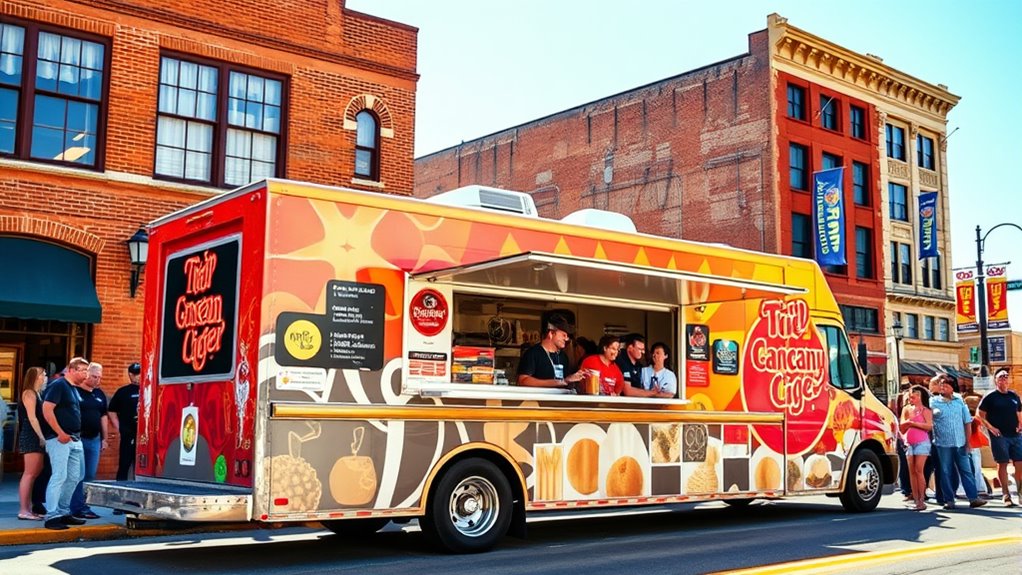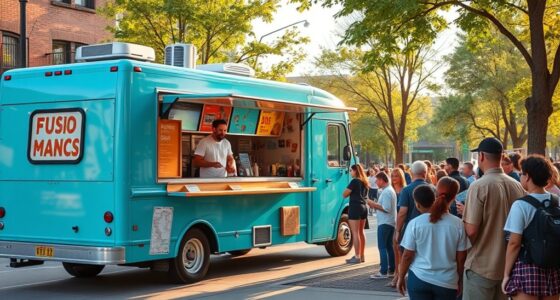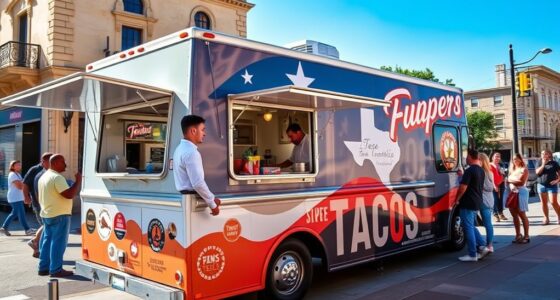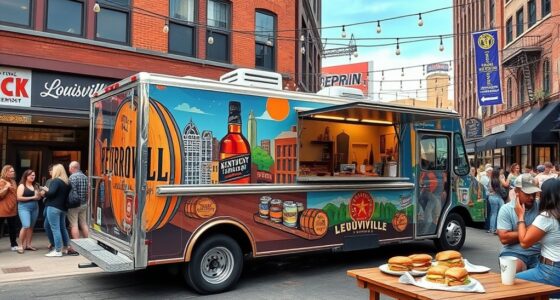To start a food truck in Cedar Rapids, you’ll need to secure permits such as a Mobile Food Vendor License (~$250/year) and a Food Establishment License from Linn County. Costs depend on your truck’s condition, with initial expenses from $46,700 to over $187,000, plus ongoing fees for permits, insurance, and supplies. Choose central locations, avoid restricted zones, and participate in local events to grow your brand. If you keep exploring, you’ll find tips to keep your operations smooth and compliant.
Key Takeaways
- Obtain necessary permits including a Mobile Food Vendor License (~$250/year) from Linn County and Food Establishment License from Linn County Public Health.
- Initial costs range from $46,700 to $187,440, covering truck, equipment, permits, and inventory.
- Choose accessible, central locations like parks or downtown, and participate in community events for visibility.
- Ensure menu aligns with classification (prepackaged, limited assembly, onsite cooking) and meets health and safety standards.
- Use social media and local events to market your food truck, engage customers, and build community loyalty.
Navigating Permits and Licensing in Cedar Rapids
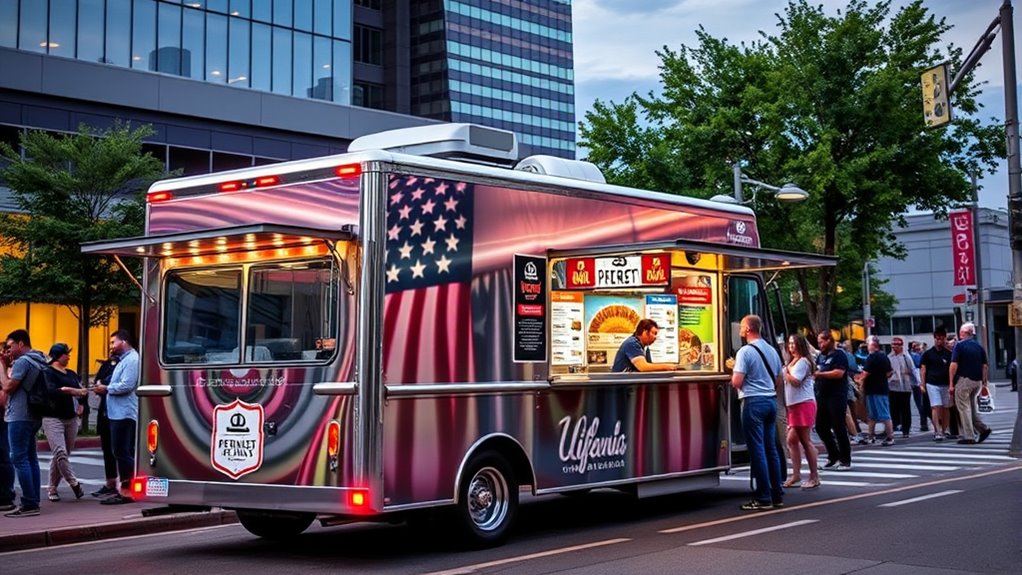
Are you ready to start your food truck business in Cedar Rapids? Navigating permits and licensing is your first step. You’ll need a Mobile Food Vendor License from the City of Cedar Rapids, which costs $100 for one week, $300 for six months, or $550 annually. Blue Zones certified vendors qualify for discounts—$250 for six months or $500 for a year—proof required. Payment is only by cash or check, payable to the City Treasurer. For temporary transfers, submit an application, parking agreement, and pay a $50 fee. Additionally, apply at least 30 days in advance for a Food Establishment License from Linn County Public Health, costing $250. Iowa licensing requires passing inspections and submitting detailed plans, including health and safety regulations that must be adhered to. Proper permits ensure compliance and smooth operation.
Understanding Costs and Fees for Food Truck Operations
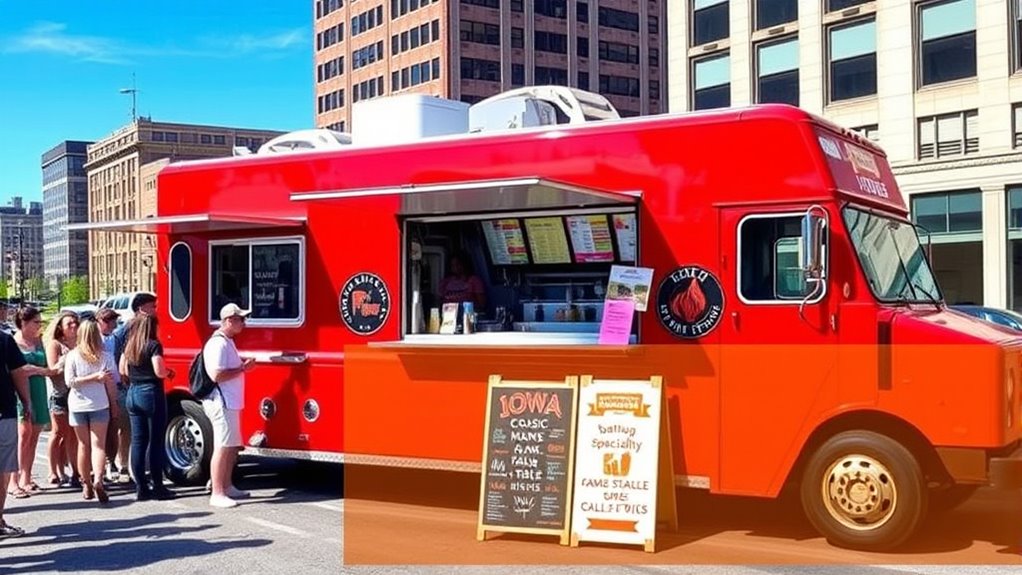
Understanding the costs and fees involved in food truck operations is essential for planning a successful business in Cedar Rapids. Starting costs for a food truck range from about $46,700 to $187,440, depending on condition and equipment. If your truck isn’t pre-equipped, renovations can add several thousand dollars. You’ll need to budget $1,000 to $5,000 for initial inventory, based on your menu. Licensing fees are roughly $250 annually per unit, with additional local permits. Registration for trailers costs $25 or $50, depending on weight. Recurring expenses include fuel, propane, maintenance, and repairs, totaling around $1,300 to $4,000 monthly. Labor costs, insurance, generator, POS systems, and marketing also add to your ongoing costs. Planning for these expenses guarantees your food truck runs smoothly and profitably. Additionally, understanding the costs and fees associated with payment processing can help you manage your business finances more effectively.
Finding Suitable Locations and Parking Regulations
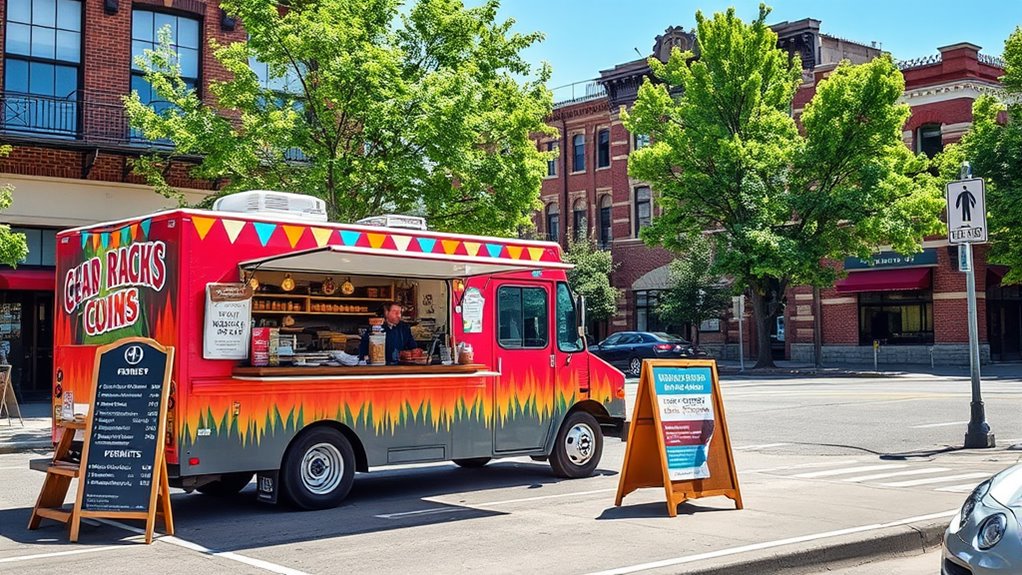
To operate smoothly in Cedar Rapids, you need to find suitable parking spots that comply with city regulations. Downtown, you may be assigned one or two numbered parking spaces based on your truck size, requiring a license from the City Clerk’s Office. Metered spaces are available if you pay the fee or reserve the spot through ParkCR. After 6 PM on weekdays and all day on weekends, parking fees are waived, but reserving a spot isn’t necessary. You can park without payment from 10 PM to 2 AM, but must use a ParkCR placard for enforcement during operating hours. Remember, parking near restaurants, stop signs, or park concession stands is prohibited, and licensing from the Linn County Health Department is mandatory before vending. Supported browsers include Google Chrome, Mozilla Firefox, and Microsoft Internet Explorer. Ensuring your browser is up-to-date will help you access online resources for parking permits and other necessary applications. Additionally, staying informed about security zone info can help you avoid parking in restricted areas during your food truck operations.
Designing a Compliant Menu and Equipment Setup
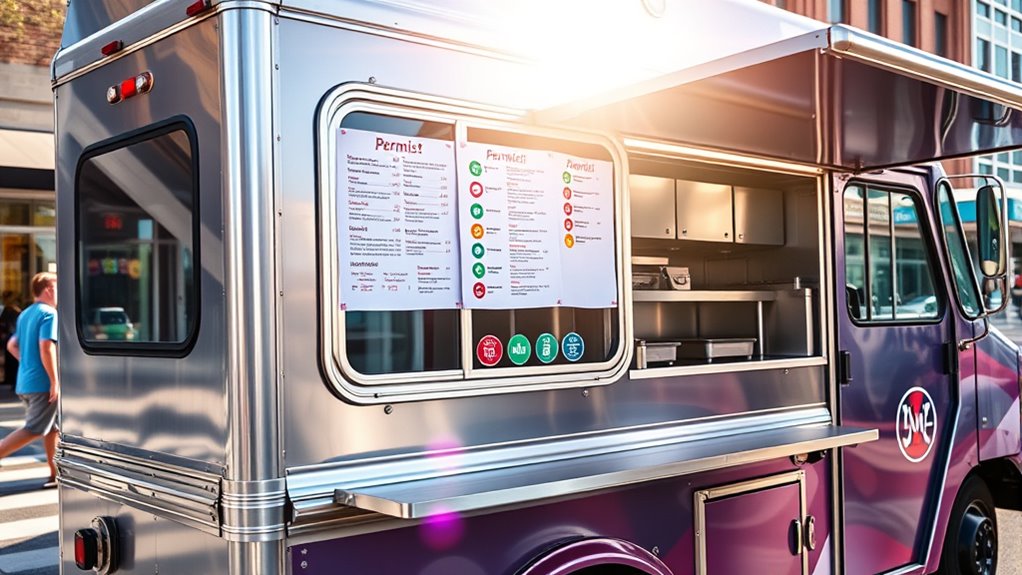
When designing your menu and equipment setup, you need to guarantee they meet Iowa’s food safety and compliance standards. Focus on selecting menu items that fit your truck’s classification and require minimal on-site prep, while planning your space efficiently. Proper equipment placement and storage are essential for maintaining hygiene and adhering to health regulations. Incorporating rustic decor elements can also enhance your food truck’s appeal and align with the overall aesthetic.
Menu Planning and Food Safety
Designing a compliant menu and setting up your food truck equipment requires careful planning to meet Iowa’s food safety regulations. First, identify your truck’s classification: Class I, II, III, or IV. Each has specific menu constraints—Class I only offers prepackaged foods, while Class II can serve prepackaged, potentially hazardous items prepared elsewhere. Class III allows limited assembly, and Class IV permits onsite cooking with specific equipment. Your menu must align with these rules, emphasizing pre-made, commercially prepared items to minimize risks. Proper temperature controls for hot and refrigerated foods are essential, along with sourcing ingredients from licensed suppliers. Confirm all food prep occurs in licensed kitchens or commissaries. Additionally, maintaining food safety standards such as proper sanitation and employee hygiene is critical for compliance and customer safety. Lastly, prepare detailed documentation for inspections, demonstrating compliance with Iowa’s sanitation and safety standards.
Equipment and Space Requirements
Creating a compliant food truck setup involves carefully planning your equipment and space layout to meet Iowa’s safety and regulatory standards. You need to guarantee your truck has proper lighting, reflectors, and braking systems for road safety. For sanitation, include a handwashing sink with hot water, soap, and towels, using tested water sources, and connect waste to approved sanitation systems. Your internal layout must feature a detailed floor plan showing equipment, manufacturer info, and sanitation zones, with surfaces that are easy to clean. Cooking equipment should be installed safely, with proper ventilation and exhaust systems, and only use approved units suitable for your truck’s classification. Design your space for mobility, ensuring all equipment is securely installed, with dedicated storage, optimized for efficient workflow without compromising compliance. Additionally, incorporating self-watering plant pots into your truck’s design can help maintain a pleasant environment and support any on-site gardening efforts.
Effective Marketing Strategies for Food Truck Success
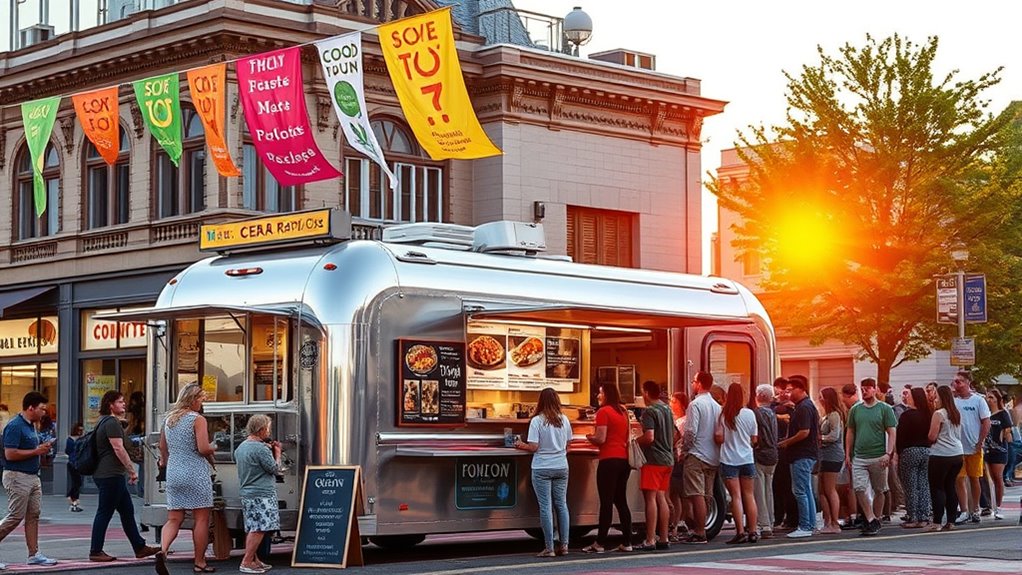
To stand out in Cedar Rapids, you should harness social media platforms like Facebook and use targeted hashtags to attract Millennials and Gen Z. Participating in local festivals and community events can boost your visibility and build a loyal customer base. Combining digital marketing with grassroots efforts creates a powerful strategy for food truck success. Additionally, implementing loyalty programs and seasonal promotions can lead to a 30% increase in repeat visits and customer engagement. Engaging with your audience through local community involvement can also foster stronger relationships and enhance brand loyalty.
Leverage Social Media Platforms
Leveraging social media platforms is essential for food truck success, as it helps you reach your target audience, boost visibility, and build a loyal customer base. Focus on the platforms your customers use most, like Facebook, Instagram, TikTok, and Twitter. Consistent branding across channels builds recognition and trust, while posting engaging content increases interaction. Use videos, behind-the-scenes shots, and daily updates to showcase your menu and location. Encourage user-generated content and respond promptly to comments to foster relationships. Consider social media ads, giveaways, and influencer collaborations to amplify your reach. For example, you can:
- Run targeted Facebook and Instagram ads
- Share behind-the-scenes videos on TikTok
- Post daily menu updates and location info
- Host giveaways or contests
- Respond to customer comments quickly
Additionally, analyzing engagement metrics regularly helps you refine your strategies and maximize your marketing efforts. Incorporating AI-powered analytics can further enhance your understanding of audience preferences and optimize your social media campaigns effectively.
Participate in Community Events
Participating in community events offers a powerful way to boost your food truck’s visibility and connect directly with local customers. Cedar Rapids hosts annual festivals like the Street Food Festival at Ellis Park, featuring local trucks, live music, and charitable donations, drawing diverse crowds. The Freedom FEASTival at Greene Square Park includes entertainment and kids’ activities, encouraging high community engagement. Regular gatherings like Food Truck Thursdays and Summer in the Square provide consistent exposure, helping you build a loyal customer base. Choosing central, accessible locations in parks or downtown ensures maximum foot traffic from families, workers, and tourists. Collaborating with event organizers and community partners enhances your visibility and reputation, while exclusive event specials create excitement and repeat business. Additionally, maintaining your vehicle’s drivetrain and equipment can ensure reliable service during these busy events. These efforts position your truck as a valued community fixture.
Ensuring Smooth Operations and Staying Compliant
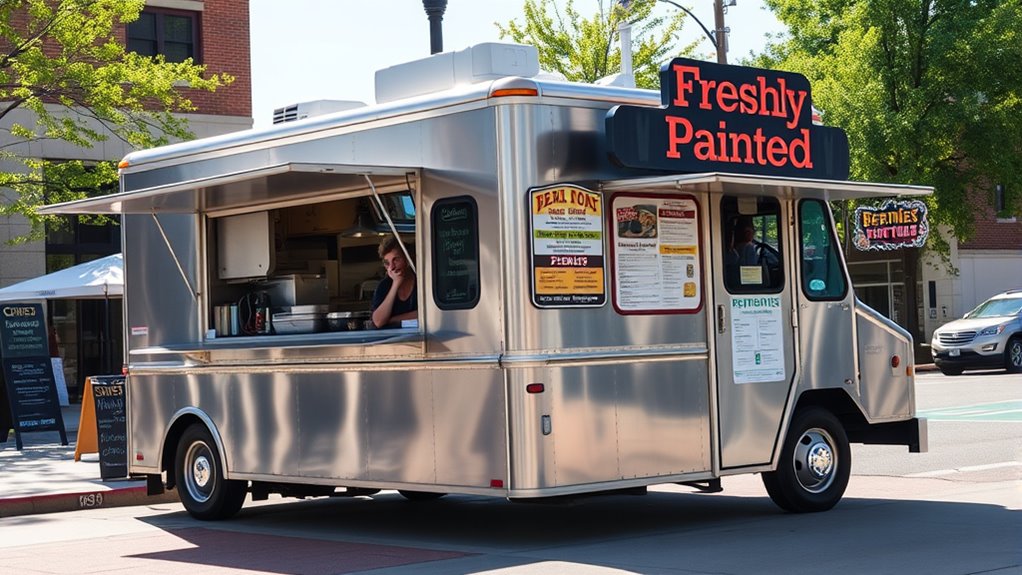
Ensuring smooth operations and staying compliant requires careful attention to regulations and safety standards. You need to secure a Mobile Food Vendor License from the Linn County Health Department, which involves a $250 annual fee, plan review, and pre-op inspection. Remember to apply at least 30 days before your start date.
Stay on top of local ordinances—avoid leaving your cart unattended and obtain special event permits if vending at festivals. Maintain health standards by ensuring your truck has a proper hand-washing sink, fire safety permits, and adheres to operating hours.
Be mindful of parking rules, such as reserving spots with ParkCR and paying meters when needed. Keep track of costs for licensing, inspections, and permits to keep your operation running smoothly and legally.
Frequently Asked Questions
Can I Operate My Food Truck Outside Cedar Rapids Without Additional Permits?
You can’t operate your food truck outside Cedar Rapids without getting additional permits. Each county or city has its own licensing requirements, and operating without them could lead to fines or shutdowns. You need to acquire the proper licenses, health inspections, and fire permits for each jurisdiction where you plan to serve. Planning ahead and securing all necessary paperwork ensures your food truck runs smoothly across different locations.
What Are the Specific Requirements for a Blue Zones Certification Discount?
Like a key opening a door, the Blue Zones certification grants savings for your food truck in Cedar Rapids. To qualify, you must submit a valid certification with your license application, showing your commitment to healthful, sustainable practices. Keep your certification current, and you’ll get a $50 discount on the license fee—$250 for six months or $500 annually. Just make sure your application is complete and meets all local health and safety rules.
How Do I Transfer My License if I Move to a New Location?
To transfer your license when moving to a new location, you need to submit a completed “Food Truck Transfer” application form along with an approved parking agreement from Park CR. You must include the new address details and pay the applicable transfer fee, which is $50 for voluntary transfers. Remember, you’ll also need to make certain your new location passes health inspections and meets all local regulations before the transfer is approved.
Are There Restrictions on the Type of Cuisine I Can Serve?
You might wonder if there are restrictions on the cuisine you can serve. While Iowa doesn’t ban specific cuisine types, your menu must comply with health and safety standards. Your food preparation methods and equipment are limited by your truck’s classification, which could affect your menu choices. Make sure to follow local zoning and licensing rules, and coordinate with health authorities to ensure your cuisine fits within regulations.
What Are the Requirements for Hiring Certified Food Protection Managers?
Imagine trying to run a food business without a CFPM—it’s like trying to steer a ship with no captain! Iowa law demands that you hire at least one Certified Food Protection Manager who’s passed an accredited exam. You must keep their certification current, and they need to be available during all operating hours. Employers must maintain proof of certification and ensure the manager stays compliant to avoid penalties or shutdowns.
Conclusion
As you weave through Cedar Rapids’ vibrant streets, remember that with careful planning and a touch of creativity, your food truck can bloom like a well-tended garden. Stay mindful of regulations and keep your menu fresh and inviting. With each step, you’re shaping a flavorful journey that’ll leave a lasting impression. Embrace the process, and watch your culinary dream flourish amidst the city’s lively pulse. Your success is just over the horizon, waiting to be uncovered.
